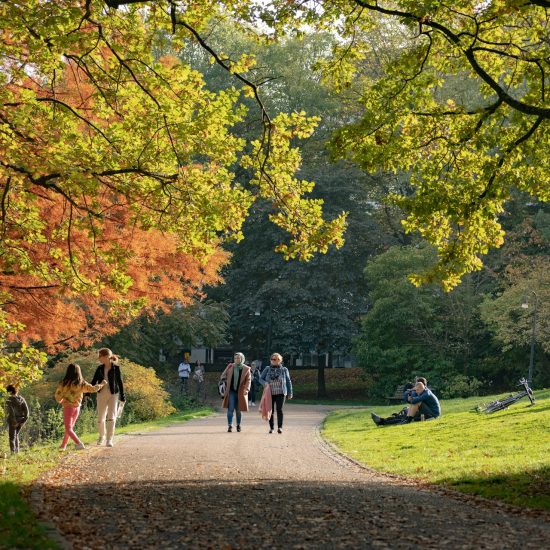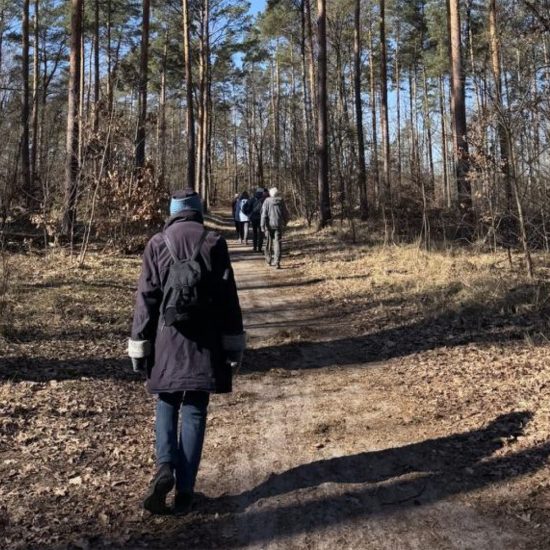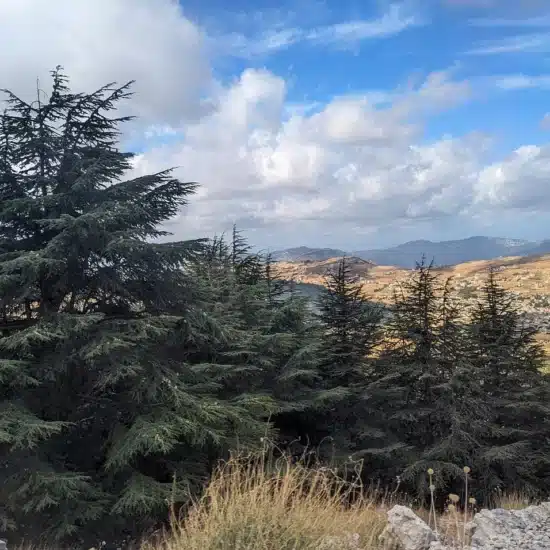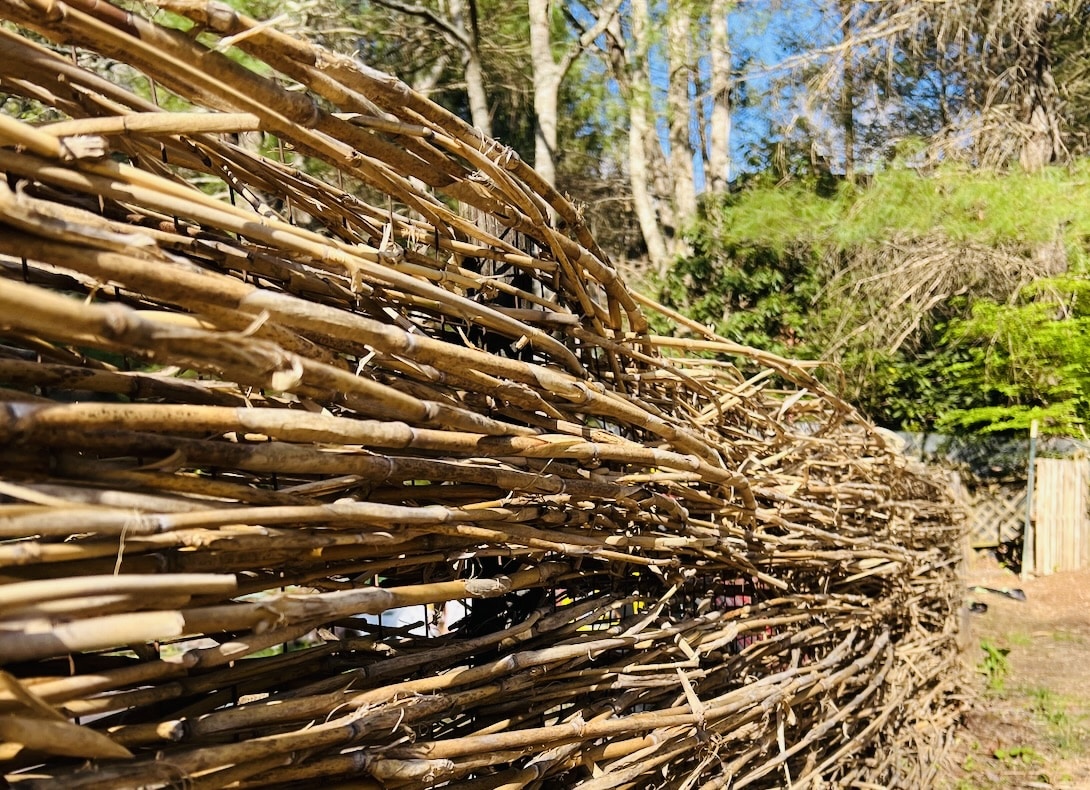
At the Christmas Eve service this past December, with my son dressed as a nativity cow mooing quietly beside me, I listened to a miraculous story of the past, and I was struck by the phantasmagoric details: hosts of angels, mysterious visitors from afar, proclamations aplenty of unbelievable news. At the Easter service a few weeks ago, we were once again hearing a story about the past, but this one, particularly as it was related through the hymnody, pointed to a pretty crazy future in which believers will be joining in the glories of their conquering Christ. The preacher called it “the greatest story ever told” and — in terms of special effects necessary to pull it off — I’m apt to agree. I found myself swept up in the drama of these Christian narratives, my imagination buzzing with the promise of regular lives turned absolutely wild.
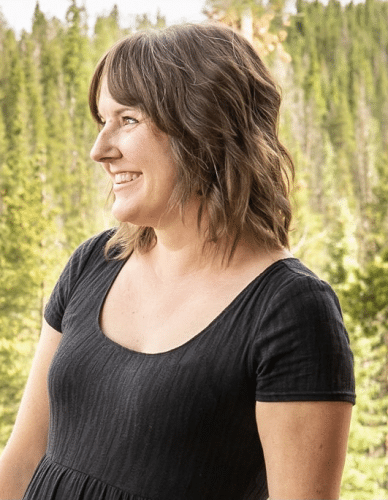
Lauren Graeber
What became clear to me as I walked away from these two high holy services was how different those hours were from my new normal. My Sundays are now mostly spent at home, often working the land on which I live. My family relocated last summer onto about 15 acres at the base of a mountain slope in NC, a mildly dramatic attempt to reconfigure our lives. These days we have a garden plot to clear and prepare. There are vines to remove, bushes to cut back, dirt and rocks and mulch to be hauled. You might say that my spiritual life is now being directed by what St. Augustine coined the Book of Nature, God’s other divine word alongside the scriptures. I have welcomed the change. On Sundays the sky is my sanctuary, the soil my preacher, birdsong my choir, and plants my accountability partners. Their lessons are quieter and I find my soul similarly quieted as I listen.
Despite my absence from formal church, I continue to be spiritually formed. There have been sermons on humility. Though I may at times wield large blades and wear protective gear, to work in the forest requires vulnerability to a host of other lives I do not control and I have been stopped in my efforts to master the world again and again by things no more impressive than the tear of a thorn. Eventually, I may learn to pay close attention and respect the defenses other creatures have erected to ensure their own survival, and maybe I’ll remember that my comfort isn’t the only variable in life’s equations. Until then my skin will be scratched and I will be itchy.
If you need a sermon on scale and perspective, my daily drive provides one. The mountains that rise around me appear like green folds, ones that bend the earth into coves and valleys, cut through by roads that seem to hairpin turn you right back where you came from, except you emerge somewhere entirely new! It isn’t that I have forgotten the overlapping harms happening around me, the crises that must be addressed so that humans and non-humans can flourish, but these old hills keep whispering that I am too small to see it all, to understand the full scope of anything, to know everything. I could believe that the world I live in is the fulcrum of existence, but the sunny skies over my house are often erased by fog and rain when I cross the continental divide on my way to work, and what I can see thriving on some slopes is dormant or threatened on others. I am limited because I am human, and slowly I’m remembering to act like it.
The altar call of my days comes from the river cane spreading out of control in a corner of our acreage. Though river cane is native to these parts, it was introduced on my land to hide a manmade meditation pond. It is growing unchecked into the forest and field that surround it, and, it turns out, river cane is a real booger to manage. Hours of my life have been spent addressing this issue. Railing about the problem has not once solved it. Neither did any machete or power tool. Only the method of stooping down with a pair of pruners to cut individual stalks has allowed us to pull back the outer edges of the cane stand in a way that doesn’t leave the ground impassable, littered with woody shoots that, with the advent of spring, have begun to put out new growth.
In the middle of our river cane management, I happened to hear a speaker talk about our relationship in the U.S. to kudzu, a plant that — like river cane — will overtake pretty much everything around it. He said that in the places where kudzu is native, there has always existed a “culture of kudzu,” a way of living with the plant as humans that benefits from its many uses and prevents it from choking out biodiversity. I came home, looked with new eyes at the piles of cane stalks we had piled up from our weeks of culling, and felt a nudge of the spirit to cultivate for us a culture of river cane. The Cherokee people, who also live in these mountains, are generations ahead of me in their relationship with the plant, using it for weaving, tools, and instrument making. Our cane break, I discovered, did not produce stalks thick enough to be useful to Cherokee artisans, but my time reading about this plant nurtured an idea.
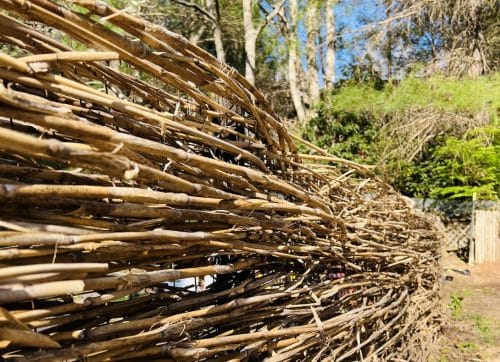
We gathered the already cut stalks and stripped them of their leaves. And we cut more, many more. The flexibility of the stalks makes them perfect for weaving into the old busted wire fence that surrounds our garden, strengthening the fence, hiding its irregularities, and producing something almost beautiful. It’s made us part of a plant culture.
It was in churches that I learned that God wanted me to tend to the earth. I am now more fully living that lesson. Ignoring the problem of the river cane would have been an abdication of my creaturely responsibility and privilege to live well on this particular patch of earth. Addressing the problem of the cane has required constant, intimate interactions with what I first took to be an enemy. Months in, I know enough about river cane to better know how to live with it, and I am finding that bending my knee for this plant is a kind of salvation from arrogance and impatience.
Perhaps this is a sermon series only I needed, and certainly I’m not the first to write it, but what I have unearthed about God on these Sundays away from church makes me want to take away the microphones of Christians clanging their cymbals: those who point at their neighbors and call them spiritual enemies, those who claim absolute understanding of complicated situations, those who insist that sharper weapons are the only way to conquer the world. I’d like to hand them simple tools and invite them to put their hands in the dirt. I’d like to replace the rapid flow of news from our smartphones with the long lessons of hours in the forest. I’d like to finally hear Jesus’ repeated use of agrarian examples not as clever metaphors but as deep wisdom about where and how to encounter a life of faith.
I have traded pews for tree stumps, yet I think the invitation to join in a miraculous story is similar. The characters are different and the drama more muted, yet I continue to experience divine hours in which life emerges in unexpected places and persists in spaces and times where it doesn’t make any sense. That is a good word from the Lord, the greatest story ever told.
Lauren Graeber writes a little and teaches a lot. She loves to help folks discover the sacred surprises waiting for you when you pick up a pen. She navigates faith, parenting, and questions that delightfully refuse to be answered on IG @definitelysometimes.

